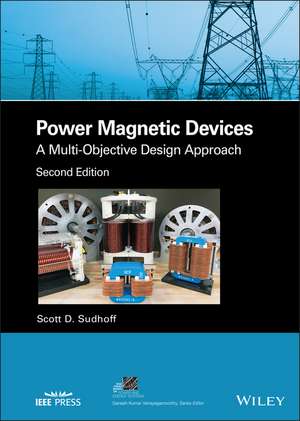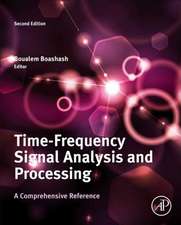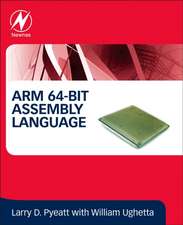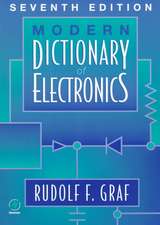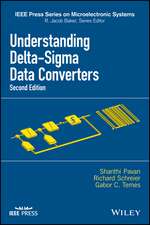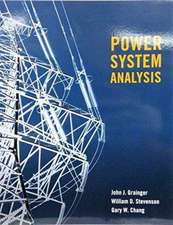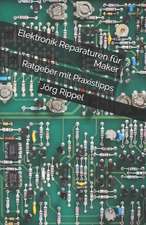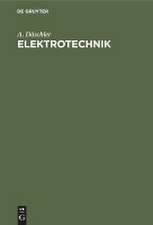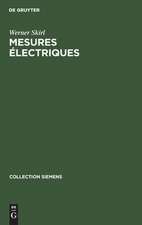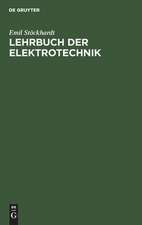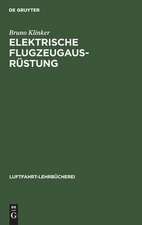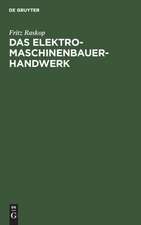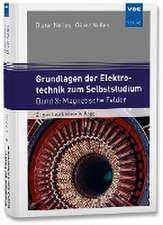Power Magnetic Devices – A Multi–Objective Design Approach, Second Edition: IEEE Press Series on Power and Energy Systems
Autor Sudhoffen Limba Engleză Hardback – 29 noi 2021
In the newly revised second edition of Power Magnetic Devices: A Multi-Objective Design Approach, accomplished engineer and author Dr. Scott D. Sudhoff delivers a thorough exploration of the design principles of power magnetic devices such as inductors, transformers, and rotating electric machinery using a systematic and consistent framework.
The book includes new chapters on converter and inverter magnetic components (including three-phase and common-mode inductors) and elaborates on characteristics of power electronics that are required knowledge in magnetics. New chapters on parasitic capacitance and finite element analysis have also been incorporated into the new edition. The work further includes:
- A thorough introduction to evolutionary computing-based optimization and magnetic analysis techniques
- Discussions of force and torque production, electromagnet design, and rotating electric machine design
- Full chapters on high-frequency effects such as skin- and proximity-effect losses, core losses and their characterization, thermal analysis, and parasitic capacitance
- Treatments of dc-dc converter design, as well as three-phase and common-mode inductor design for inverters
- An extensive open-source MATLAB code base, PowerPoint slides, and a solutions manual
Din seria IEEE Press Series on Power and Energy Systems
- 24%
 Preț: 652.67 lei
Preț: 652.67 lei - 24%
 Preț: 609.53 lei
Preț: 609.53 lei - 19%
 Preț: 521.21 lei
Preț: 521.21 lei - 24%
 Preț: 784.16 lei
Preț: 784.16 lei - 24%
 Preț: 1053.86 lei
Preț: 1053.86 lei - 9%
 Preț: 809.68 lei
Preț: 809.68 lei - 9%
 Preț: 831.27 lei
Preț: 831.27 lei - 9%
 Preț: 888.01 lei
Preț: 888.01 lei - 9%
 Preț: 950.76 lei
Preț: 950.76 lei - 9%
 Preț: 869.23 lei
Preț: 869.23 lei - 9%
 Preț: 1196.97 lei
Preț: 1196.97 lei - 9%
 Preț: 849.90 lei
Preț: 849.90 lei - 9%
 Preț: 1015.99 lei
Preț: 1015.99 lei - 8%
 Preț: 654.00 lei
Preț: 654.00 lei - 8%
 Preț: 633.18 lei
Preț: 633.18 lei - 9%
 Preț: 823.81 lei
Preț: 823.81 lei - 9%
 Preț: 759.78 lei
Preț: 759.78 lei - 9%
 Preț: 855.00 lei
Preț: 855.00 lei - 9%
 Preț: 972.84 lei
Preț: 972.84 lei - 9%
 Preț: 1023.14 lei
Preț: 1023.14 lei - 9%
 Preț: 758.19 lei
Preț: 758.19 lei - 9%
 Preț: 946.67 lei
Preț: 946.67 lei - 9%
 Preț: 1002.09 lei
Preț: 1002.09 lei - 8%
 Preț: 648.70 lei
Preț: 648.70 lei - 9%
 Preț: 1077.09 lei
Preț: 1077.09 lei - 9%
 Preț: 1118.73 lei
Preț: 1118.73 lei - 9%
 Preț: 1017.31 lei
Preț: 1017.31 lei - 9%
 Preț: 814.32 lei
Preț: 814.32 lei - 9%
 Preț: 830.83 lei
Preț: 830.83 lei - 9%
 Preț: 834.87 lei
Preț: 834.87 lei - 9%
 Preț: 893.28 lei
Preț: 893.28 lei - 9%
 Preț: 929.27 lei
Preț: 929.27 lei - 9%
 Preț: 1301.39 lei
Preț: 1301.39 lei - 9%
 Preț: 855.70 lei
Preț: 855.70 lei - 9%
 Preț: 781.26 lei
Preț: 781.26 lei - 9%
 Preț: 1009.20 lei
Preț: 1009.20 lei - 9%
 Preț: 886.41 lei
Preț: 886.41 lei - 9%
 Preț: 730.17 lei
Preț: 730.17 lei - 9%
 Preț: 822.19 lei
Preț: 822.19 lei - 9%
 Preț: 963.72 lei
Preț: 963.72 lei - 9%
 Preț: 726.13 lei
Preț: 726.13 lei - 9%
 Preț: 953.44 lei
Preț: 953.44 lei - 9%
 Preț: 851.69 lei
Preț: 851.69 lei - 9%
 Preț: 1200.59 lei
Preț: 1200.59 lei - 9%
 Preț: 947.55 lei
Preț: 947.55 lei - 9%
 Preț: 777.30 lei
Preț: 777.30 lei - 9%
 Preț: 715.62 lei
Preț: 715.62 lei - 9%
 Preț: 786.64 lei
Preț: 786.64 lei - 9%
 Preț: 962.47 lei
Preț: 962.47 lei - 9%
 Preț: 810.41 lei
Preț: 810.41 lei
Preț: 899.55 lei
Preț vechi: 988.51 lei
-9% Nou
Puncte Express: 1349
Preț estimativ în valută:
172.12€ • 180.20$ • 142.42£
172.12€ • 180.20$ • 142.42£
Carte tipărită la comandă
Livrare economică 05-19 aprilie
Preluare comenzi: 021 569.72.76
Specificații
ISBN-13: 9781119674603
ISBN-10: 1119674603
Pagini: 656
Dimensiuni: 178 x 254 x 32 mm
Greutate: 1.34 kg
Ediția:2nd Edition
Editura: Wiley
Seria IEEE Press Series on Power and Energy Systems
Locul publicării:Hoboken, United States
ISBN-10: 1119674603
Pagini: 656
Dimensiuni: 178 x 254 x 32 mm
Greutate: 1.34 kg
Ediția:2nd Edition
Editura: Wiley
Seria IEEE Press Series on Power and Energy Systems
Locul publicării:Hoboken, United States
Cuprins
Author Biography xiii
Preface xv
About the Companion Site xix
1 Optimization-Based Design 1
1.1 Design Approach 1
1.2 Mathematical Properties of Objective Functions 3
1.3 Single-Objective Optimization Using Newton's Method 5
1.4 Genetic Algorithms: Review of Biological Genetics 7
1.5 The Canonical Genetic Algorithm 10
1.6 Real-Coded Genetic Algorithms 15
1.7 Multi-Objective Optimization and the Pareto-Optimal Front 25
1.8 Multi-Objective Optimization Using Genetic Algorithms 27
1.9 Formulation of Fitness Functions for Design Problems 31
1.10 A Design Example 33
References 39
Problems 40
2 Magnetics and Magnetic Equivalent Circuits 43
2.1 Ampere's Law, Magnetomotive Force, and Kirchhoff's MMF Law for Magnetic Circuits 43
2.2 Magnetic Flux, Gauss's Law, and Kirchhoff's Flux Law for Magnetic Circuits 46
2.3 Magnetically Conductive Materials and Ohm's Law For Magnetic Circuits 48
2.4 Construction of the Magnetic Equivalent Circuit 56
2.5 Translation of Magnetic Circuits to Electric Circuits: Flux Linkage and Inductance 59
2.6 Representing Fringing Flux in Magnetic Circuits 64
2.7 Representing Leakage Flux in Magnetic Circuits 68
2.8 Numerical Solution of Nonlinear Magnetic Circuits 80
2.9 Permanent Magnet Materials and Their Magnetic Circuit Representation 95
2.10 Closing Remarks 98
References 98
Problems 99
3 Introduction to Inductor Design 103
3.1 Common Inductor Architectures 103
3.2 DC Coil Resistance 105
3.3 DC Inductor Design 108
3.4 Case Study 113
3.5 Closing Remarks 119
References 120
Problems 120
4 Force and Torque 123
4.1 Energy Storage in Electromechanical Devices 123
4.2 Calculation of Field Energy 125
4.3 Force from Field Energy 127
4.4 Co-Energy 128
4.5 Force from Co-Energy 132
4.6 Conditions for Conservative Fields 133
4.7 Magnetically Linear Systems 134
4.8 Torque 135
4.9 Calculating Force Using Magnetic Equivalent Circuits 135
References 139
Problems 139
5 Introduction to Electromagnet Design 141
5.1 Common Electromagnet Architectures 141
5.2 Magnetic, Electric, and Force Analysis of an Ei-Core Electromagnet 141
5.3 EI-Core Electromagnet Design 151
5.4 Case Study 155
References 162
Problems 163
6 Magnetic Core Loss and Material Characterization 165
6.1 Eddy Current Losses 165
6.2 Hysteresis Loss and the B-H Loop 172
6.3 Empirical Modeling of Core Loss 177
6.4 Magnetic Material Characterization 183
6.5 Measuring Anhysteretic Behavior 188
6.6 Characterizing Behavioral Loss Models 197
6.7 Time-Domain Loss Modeling: the Preisach Model 201
6.8 Time-Domain Loss Modeling: the Extended Jiles-Atherton Model 205
References 211
Problems 212
7 Transformer Design 215
7.1 Common Transformer Architectures 215
7.2 T-Equivalent Circuit Model 217
7.3 Steady-State Analysis 221
7.4 Transformer Performance Considerations 223
7.5 Core-Type Transformer Configuration 231
7.6 Core-Type Transformer MEC 238
7.7 Core Loss 244
7.8 Core-Type Transformer Design 245
7.9 Case Study 251
7.10 Closing Remarks 259
References 260
Problems 260
8 Distributed Windings and Rotating Electric Machinery 263
8.1 Describing Distributed Windings 263
8.2 Winding Functions 271
8.3 Air-Gap Magneto Motive Force 276
8.4 Rotating MMF 278
8.5 Flux Linkage and Inductance 280
8.6 Slot Effects and Carter's Coefficient 282
8.7 Leakage Inductance 284
8.8 Resistance 289
8.9 Introduction to Reference Frame Theory 290
8.10 Expressions for Torque 294
References 299
Problems 299
9 Introduction to Permanent Magnet AC Machine Design 303
9.1 Permanent Magnet Synchronous Machines 303
9.2 Operating Characteristics of PMAC Machines 305
9.3 Machine Geometry 312
9.4 Stator Winding 317
9.5 Material Parameters 320
9.6 Stator Currents and Control Philosophy 320
9.7 Radial Field Analysis 321
9.8 Lumped Parameters 326
9.9 Ferromagnetic Field Analysis 327
9.10 Formulation of Design Problem 332
9.11 Case Study 336
9.12 Extensions 344
References 345
Problems 346
10 Introduction to Thermal Equivalent Circuits 349
10.1 Heat Energy, Heat Flow, and the Heat Equation 349
10.2 Thermal Equivalent Circuit of One-Dimensional Heat Flow 352
10.3 Thermal Equivalent Circuit of a Cuboidal Region 358
10.4 Thermal Equivalent Circuit of a Cylindrical Region 361
10.5 Inhomogeneous Regions 367
10.6 Material Boundaries 373
10.7 Thermal Equivalent Circuit Networks 376
10.8 Case Study: Thermal Model of Electromagnet 380
References 396
Problems 397
11 Alternating Current Conductor Losses 399
11.1 Skin Effect in Strip Conductors 399
11.2 Skin Effect in Cylindrical Conductors 405
11.3 Proximity Effect in a Single Conductor 409
11.4 Independence of Skin and Proximity Effects 411
11.5 Proximity Effect in a Group of Conductors 413
11.6 Relating Mean-Squared Field and Leakage Permeance 416
11.7 Mean-Squared Field for Select Geometries 417
11.8 Conductor Losses in Rotating Machinery 422
11.9 Conductor Losses in a UI-Core Inductor 426
11.10 Closing Remarks 431
References 431
Problems 432
12 Parasitic Capacitance 433
12.1 Modeling Approach 433
12.2 Review of Electrostatics 434
12.3 Turn-to-Turn Capacitance 442
12.4 Coil-to-Core Capacitance 446
12.5 Layer-to-Layer Capacitance 449
12.6 Capacitance in Multi-Winding Systems 452
12.7 Measuring Capacitance 455
References 458
Problems 459
13 Buck Converter Design 461
13.1 Buck Converter Analysis 461
13.2 Semiconductors 469
13.3 Heat Sink 472
13.4 Capacitors 474
13.5 UI-Core Input Inductor 476
13.6 UI-Core Output Inductor 477
13.7 Operating Point Analysis 488
13.8 Design Paradigm 492
13.9 Case Study 495
13.10 Extensions 501
References 501
Problems 501
14 Three-Phase Inductor Design 503
14.1 System Description 503
14.2 Inductor Geometry 516
14.3 Magnetic Equivalent Circuit 518
14.4 Magnetic Analysis 529
14.5 Inductor Design Paradigm 533
14.6 Case Study 537
References 541
Problems 541
15 Common-Mode Inductor Design 543
15.1 Common-Mode Voltage and Current 543
15.2 System Description 545
15.3 Common-Mode Equivalent Circuit 546
15.4 Common-Mode Inductor Specification 552
15.5 UR-Core Common-Mode Inductor 557
15.6 UR-Core Common-Mode Inductor Magnetic Analysis 562
15.7 Common-Mode Inductor Design Paradigm 564
15.8 Common-Mode Inductor Case Study 566
References 571
Problems 571
16 Finite Element Analysis 573
16.1 Maxwell's and Poisson's Equations 573
16.2 Finite Element Analysis Formulation 575
16.3 Finite Element Analysis Implementation 580
16.4 Closing Remarks 587
References 588
Problems 588
Appendix A Conductor Data and Wire Gauges 589
Appendix B Selected Ferrimagnetic Core Data 593
Appendix C Selected Magnetic Steel Data 595
Appendix D Selected Permanent Magnet Data 599
Appendix E Phasor Analysis 601
Appendix F Trigonometric Identities 607
Index 609
Notă biografică
SCOTT D. SUDHOFF, PhD, is a Professor of Electrical and Computer Engineering at Purdue University. He served as Editor-in-Chief of IEEE???s Transactions on Energy Conversion and IEEE???s Power and Energy Technology Systems Journal. He is an IEEE Fellow, recipient of the Veinott award, and co-author of the Wiley-IEEE Press title Analysis of Electric Machinery and Drive Systems, Third Edition (2013). Dr. Sudhoff also holds patents in the areas of solid-state distribution transformers, stability of power-electronics based systems, and novel electric machine design concepts.
